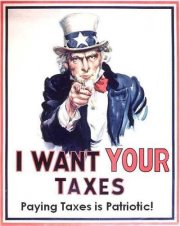NEW YORK | Every Republican candidate is trying to get as much political momentum as possible these days. And the tax code renewal is particularly inspiring the frontrunners.
 Herman Cain’s 9-9-9 tax proposal (9 percent federal sales tax, a 9 percent income tax and a 9 percent levy on businesses) has been a big point of focus, both because of his claims of the plan’s simplicity, as well as the criticisms it has inspired (some call it “Cain’s numerology fixation“. According to the Tax Policy Center, quoted by the Washington Post, while many upper-income taxpayers would get reductions under the proposal, 84 percent of Americans, many with lower incomes, would pay higher taxes.
Herman Cain’s 9-9-9 tax proposal (9 percent federal sales tax, a 9 percent income tax and a 9 percent levy on businesses) has been a big point of focus, both because of his claims of the plan’s simplicity, as well as the criticisms it has inspired (some call it “Cain’s numerology fixation“. According to the Tax Policy Center, quoted by the Washington Post, while many upper-income taxpayers would get reductions under the proposal, 84 percent of Americans, many with lower incomes, would pay higher taxes.
Texas governor Rick Perry also wants a piece of the action. Hoping to rebound in the polls, he has recently hired new staff with national experience and is proposing an aggressive optional 20% flat-tax plan: no estate tax, no capital gains tax and no dividends tax. As well as Cain, he will probably have to face the question whether his plan benefits the wealthy Americans and also if it will provide enough revenue for the State.
We recommend you to read the transcript of the interview CNBC’s John Harwood with governor Perry in which the latter admits that he fundamentally believes the US should not have a progressive tax system.
Former Massachusetts governor Mitt Romney was quoted last August saying: “I love a flat tax“. He added that you have to make sure it “doesn’t raise taxes on middle-income Americans”. However, points out The New York Times, Romney has a long record of criticizing such plans and famously derided Steve Forbes’s 1996 proposal as a “tax cut for fat cats.”
On Monday, Former House Speaker Newt Gingrich sent reporters a document to probe that he has been advocating for an optional tax plan since the nineties. He also explained his position in an op-ed of an Iowa newspaper, claiming that “optional flat tax will launch recovery”.
Many flat-tax plans that have been floated in the last two decades in the US. Independent analysts say it is hard to imagine one that would not be very regressive compared with the current system.





Be the first to comment on "The US new battle arena: tax policy"